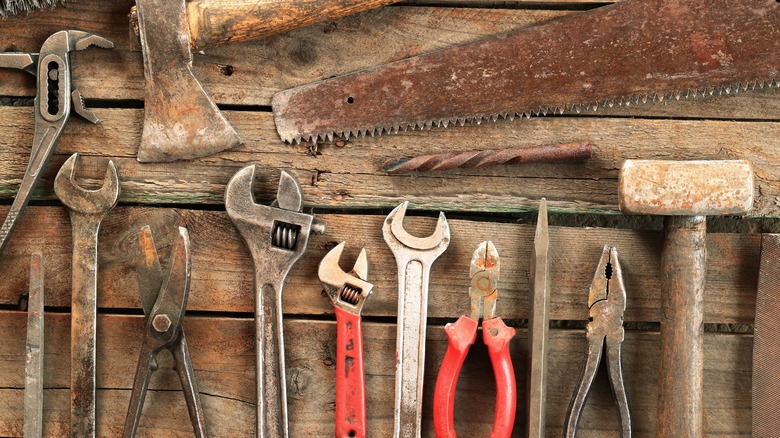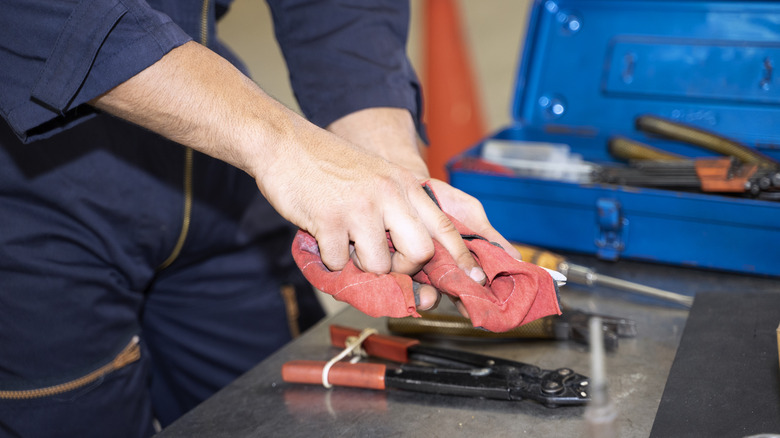Tips To Keep Your Tools From Rusting During The Winter Months
We may receive a commission on purchases made from links.
As the colder months approach, it's easy to leave tools forgotten in the garage or shed. But if you're hoping to pull out ready-to-use, rust-free tools in the spring, you'll need to take a few precautionary steps. Cold temperatures and increased humidity can make winter the perfect time for rust to settle in. Here are a few ways to keep your tools safe from corrosion so you can increase their lifespan and avoid spending money on replacements.
One of the best things you can do to protect your tools is to clean and dry them thoroughly before winter storage. Tools often accumulate grime, oil, or even soil after being used, which can trap moisture and make rust more likely to form. There are brilliant hacks for using vinegar to remove rust, but you can start by wiping down each tool with a rag or cloth, focusing on removing any debris. For tougher spots, you can use a wire brush or fine sandpaper to scrape away stubborn dirt or rust. Once they're cleaned, go over each tool with a dry cloth to remove any leftover moisture.
After cleaning, consider adding a layer of protective oil to metal surfaces. Linseed oil, mineral oil and WD40 work well. Apply a light coat using a cloth or brush, making sure to cover all metal parts. This oil barrier helps repel moisture, preventing rust from forming even in humid conditions. For a more extensive rust-prevention step, consider investing in a spray-on treatment like Rust-Oleum Stops Rust Inhibitor. These sprays are designed to leave a fine coating on metal, which resists moisture effectively throughout the winter.
Store tools in a controlled environment
The place where you store your tools plays a significant role in preventing rust. Unheated garages or outdoor sheds can experience significant temperature fluctuations and high humidity, which contribute to condensation on metal surfaces. Ideally, tools should be kept in a space with relatively stable temperature and humidity, such as a heated garage, basement, or even a closet inside your home. If indoor storage isn't an option, there are other ways to make a garage or shed less prone to rust-causing moisture. One way to control humidity is to use a dehumidifier or a moisture absorber in your storage area.
Electric dehumidifiers work well in larger spaces, while moisture absorbers (like silica gel packs or DampRid) are effective in smaller areas and enclosed spaces. These products help reduce humidity, making it harder for rust to form. It's also wise to keep tools off the floor, where they're more exposed to cold and moisture. Use shelves, hangers, or pegboards to elevate your tools, like a DIY hanging tool storage that saves space, giving them a safer, drier place to rest during the winter months. If you're storing power tools, remember to remove any batteries and store them separately. Cold temperatures can damage batteries and reduce their lifespan, so storing them in a warmer, indoor environment is better.
Maintain tools regularly during the winter
A little regular maintenance goes a long way in keeping your tools rust-free. Winter may not be the season when you're using them frequently, but it's still a good idea to check on your tools periodically. This allows you to catch any early signs of rust before it spreads and becomes harder to remove. If you spot any early rust patches, address them immediately by scrubbing the affected area with a wire brush or steel wool. Regular check-ins also give you a chance to keep moisture-absorbing packs fresh; if they've become saturated, replace them to ensure they're continuing to work effectively.
Finally, don't forget to check the condition of toolboxes and storage containers. Metal toolboxes can rust over time, and any moisture inside will affect your tools. Consider placing a small silica gel pack inside toolboxes to help absorb moisture. If possible, switch to top-rated tool boxes made of materials like plastic, aluminum or stainless steel for a more rust-resistant option. By practicing this regular maintenance, you'll be able to keep your tools in top condition, ready for use as soon as spring rolls around.


